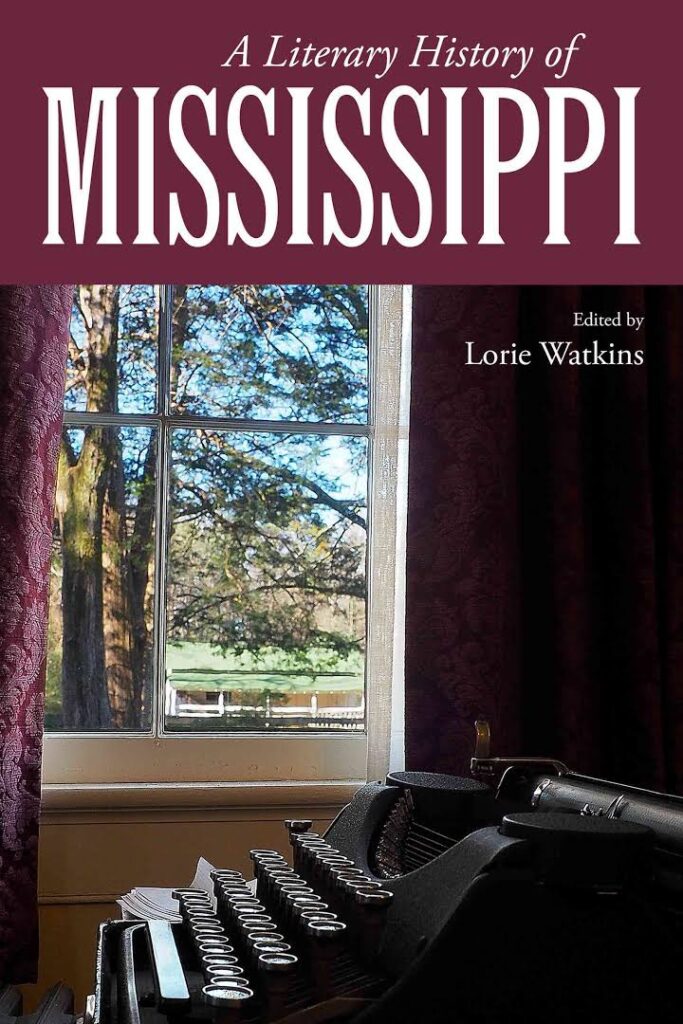
Tell about the South, one of William Faulkner’s characters once asked. What’s it like there? What do they do there? How do they live there? How do they live at all? Mississippians have never hesitated to take up this challenge, and now they have found their champion. Lorie Watkins, who teaches at William Carey University, has edited the first comprehensive history of literature in Mississippi. The scholars whose work is collected here (associated with colleges as far east as the Carolinas, as far west as Dallas, and as far north as Middle Tennessee) have honored Mississippi’s writers with a fine, wide-ranging review of their broad and varied body of work.
Theresa Towner does well at the most daunting task: the chapter on William Faulkner. She chooses to view Faulkner in the context of Mississippi history but manages to avoid the most common peril in Faulkner studies: dwelling on Faulkner’s world and the mythos of the South. Malcolm Cowley, whose Portable Faulkner first mapped Yoknapatawpha County, long ago regretted that critics focused on the mythic dimensions of Faulkner’s writing rather than on other aspects of the novelist’s craft and concerns. Towner’s path is one to follow.
Donald Shaffer, in his chapter on Richard Wright, speaks of “the South as a cultural signifier.” Fortunately, he cuts through such semioticians’ terms to look at how Mississippi’s angriest writer learned to show his outrage at both white and black Southerners and how his gifts came to be recognized by those who could appreciate them. Shaffer is also alert to the ironies and currents of literature, noting that the writer from whom Wright first learned to use words as weapons was H.L. Mencken.

Some chapters are grab-bags. Taylor Hagood’s essay on contemporary fiction writers must stretch to cover Shelby Foote, Walker Percy, Elizabeth Spencer, Ellen Douglas, Ellen Gilchrist, Barry Hannah, Richard Ford, Larry Brown, and Olympia Vernon – as well as Lewis Nordan and Steve Yarbrough, émigré novelists publishing from the North, and Texas-born carpetbagger Frederick Barthelme. Hagood wraps John Grisham, Donna Tartt, and Kathryn Stockett into one sentence, and includes Willie Morris, based on his 1973 novel, The Last of the Southern Girls. Terrence Tucker handles a similar task in “Marginalized Voices in Mississippi’s America.” This focuses on Beth Henley’s plays, comparing her dramas to the work of Stark Young, Endesha Mae Holland, and Elizabeth Spencer (Light in the Piazza and Knights and Dragons.)
Thomas Lanier “Tennessee” Williams (born in Columbus) and Margaret Walker (who could have been claimed by New Orleans or Chicago) get chapters to themselves. The chapter on Eudora Welty, “Mississippi Cosmopolite” by Suzanne Marrs, gives a succinct biography of a polished and eccentric talent. Ted Ownby provides a thoughtful reading of two ambitious historians, J.F.H. Claiborne and Dunbar Rowland – one who saw history as a chronicle of disorder, tyranny, license, and virtue, another who saw Mississippi history as a study in progress.

In Daniel Cross Turner’s chapter on modern poetry, Delta bluesman Robert Johnson and Nobel laureate Bob Dylan (“Only one thing I did wrong / Stayed in Mississippi a day too long”) overshadow Etheridge Knight, Paul Ruffin, and, unaccountably, Natasha Trethewey, who has won the Pulitzer Prize for poetry and twice served as poet laureate of the United States.

The slave narratives collected by interviewers in the 1930’s pose a deeply bitter irony: “the voice of Mississippi slaves emerges from the mouths of Mississippi slaveholders,” Lorie Watkins and Claude Pruitt write. In Mississippi, as in the rest of the South, the actual literature of the Civil War is surprisingly scant, far heavier in soldiers’ and home-front diaries than in long-form fiction. It gains heft, and depth when considered alongside antebellum writing and the literature of Reconstruction. Black writers Samuel Beadle (1857-1932) and John Roy Lynch (1847-1939) were lawyers engaged in politics; their books might well be read in tandem with Reminiscences of a Mississippian in Peace and War, by Frank A. Montgomery (1830-1903), the Confederate cavalry officer, later a legislator and judge, who organized the Ku Klux Klan in Bolivar County.
If race and history have too long obsessed Mississippi literature, there may be something redeeming in its rambunctiousness and country shrewdness. This can be seen in Larry Brown; it shows up as early as the 1840’s, in Alexander McNutt’s stories of Jem and Chunkey, two backwoods hunters who persuade a visiting Englishman to capture a “perfume otter” (which of course is really a skunk).
It is not only scholars of literature who will use this book. Those who value history will read it as well, for much of the most interesting material here deals with writers whose work is little known and whose value lies in illuminating history.

Allen Boyer, Book Editor for HottyToddy.com, is a native of Oxford. He lives and writes on Staten Island. His book “Rocky Boyer’s War,” a WWII history drawing on his father’s diary, will be published this month by the Naval Institute Press.
Follow HottyToddy.com on Instagram, Twitter and Snapchat @hottytoddynews. Like its Facebook page: If You Love Oxford and Ole Miss…
